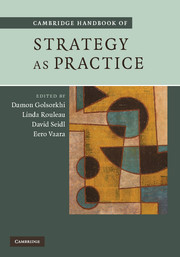Book contents
- Frontmatter
- Contents
- List of figures
- List of tables
- List of contributors
- Introduction: What is Strategy as Practice?
- PART I ONTOLOGICAL AND EPISTEMOLOGICAL QUESTIONS
- PART II THEORETICAL DIRECTIONS
- PART III METHODOLOGICAL TRACKS
- 13 Broader methods to support new insights into strategizing
- 14 Critical discourse analysis as methodology in Strategy as Practice research
- 15 Researching everyday practice: the ethnomethodological contribution
- 16 Researching strategists and their identity in practice: building ‘close-with’ relationships
- 17 Studying strategizing through narratives of practice
- PART IV APPLICATION VARIATIONS
- Author Index
- Index
- References
16 - Researching strategists and their identity in practice: building ‘close-with’ relationships
Published online by Cambridge University Press: 05 October 2012
- Frontmatter
- Contents
- List of figures
- List of tables
- List of contributors
- Introduction: What is Strategy as Practice?
- PART I ONTOLOGICAL AND EPISTEMOLOGICAL QUESTIONS
- PART II THEORETICAL DIRECTIONS
- PART III METHODOLOGICAL TRACKS
- 13 Broader methods to support new insights into strategizing
- 14 Critical discourse analysis as methodology in Strategy as Practice research
- 15 Researching everyday practice: the ethnomethodological contribution
- 16 Researching strategists and their identity in practice: building ‘close-with’ relationships
- 17 Studying strategizing through narratives of practice
- PART IV APPLICATION VARIATIONS
- Author Index
- Index
- References
Summary
Introduction
The Strategy as Practice field has, from its inception, had an interest in innovative research methodology (Balogun et al. 2003). This interest was principally driven by the recognition that empirical studies of Strategy as Practice faced contradictory pressures to on the one hand gain a necessary depth of data yet also sufficient breadth to enable theorizing based on ‘praxis, practices and practitioners’ (Whittington 2006a). The challenge being to collect data that drills deep enough to meet the micro-challenge of the Strategy as Practice agenda in terms of detail on strategic activity (Johnson et al. 2003) but also to enable a sufficient understanding of the linkages between that detail of action and ‘higher’-level outcomes in order to address the ‘so what’ question and theorize beyond the specifics of the particular context under study (Balogun et al. 2007; Jarzabkowski et al. 2007; Whittington 2007).
This chapter contributes to the developing methodological dialogue (Johnson et al. 2006; Denis et al. 2007; Langley 2007; Hodgkinson and Clark 2007) in the Strategy as Practice field. To do so, it builds on the argument advanced by Balogun et al. (2003, p. 197) that Strategy as Practice ‘research can not advance significantly without reconceptualising frequently taken-for-granted assumptions about the way to do research and the way we engage organizational participants’. However, whereas existing reflections on the methodological challenges for Strategy as Practice are typically inclusive (i.e. addressing challenges that pertain to praxis, practices and practitioners), this chapter adopts a more exclusive approach.
- Type
- Chapter
- Information
- Cambridge Handbook of Strategy as Practice , pp. 243 - 257Publisher: Cambridge University PressPrint publication year: 2010
References
- 13
- Cited by



